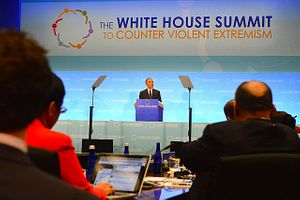Right now news in Australia is well engaged again with one of several topics close the heart of the ruling Coalition government: people smugglers. It is not going quite as well as Prime Minister Tony Abbott might hope, with allegations Australia paid off people smugglers to send boats back to Indonesia. Another preoccupation, terrorism, has been on the backburner since the recent citizenship debate. However it’s worth looking back as the most recent Countering Violent Extremism Summit, which concluded in Sydney last Friday, following on from an event in Singapore in April and another in Washington in February, which was attended by Australian Attorney General George Brandis.
Representatives from 24 other nations attended the Australian event, along with members of the Muslim community, civil society, the EU and UN, and representatives from Google and Facebook. A communiqué put out by the attorney general’s office said the event was designed to improve regional coordination and build the capacity of governments and local communities. Workshops included “Working with social media, building community‑led rehabilitation and early intervention programs, and developing inclusive national strategies to counter violent extremism.”
At her last address to the UN Security Council, Foreign Minister Julie Bishop spoke about the importance of regional coordination and capacity building in combating terrorism. She believes it to be the greatest threat to Australia and it is usually seen through some sort of ISIS-prism (though she prefers the term “Daesh”). A recent poll by the Lowy Institute, an Australian think tank, notes that Australians see ISIS as the greatest threat facing Australia in the next ten years, terrorist attacks on Australians overseas the second, and terror attacks on home soil the third. Conflict between China and the U.S. came at eight, out of eight, and after Ebola.
The CVE, with its community engagement factor and events like HackAbout, sounds positively cuddly and warm compared to recent government terrorist rhetoric. There have been the arrests, on Anzac Day this year and the raids last year with their heavy element of security theater. There has been talk of revoking the citizenship of sole Australian citizens suspected of activities, by the Immigration Minister at his discretion, the metadata laws and other elements of national security laws, and even talk of “banning” the burqa (which is not really worn in Australia in any case) by politicians such as Jacqui Lambie. A ban was proposed for Parliament House, but never went ahead.
Australia has a Muslim population of 2.2 percent, smaller than Singapore’s 15 percent or Indonesia and Malaysia’s majority. Yet terrorism is still considered a threat and seen largely in terms of Islamic extremism. Australia, as we have reported, has a high per capita proportion of nationals fighting for ISIS and fears of “radicalization” of youths are strong. Not all have been Muslim: Australian teenager Jack Bilardi grew up in middle Australia yet joined the organization. Bishop has said that 115 Australian passports have been cancelled. She also noted one fifth of those joining ISIS are female.
Abbott’s opening remarks that ISIS “is coming if it can for every person and every government with a simple message: submit or die” may have toed the muscular rhetoric party line, yet the engagement side of the CVE Summit is new for the government. Professor Greg Barton, at Melbourne’s Monash University, told The Guardian that the government was initially “very cold” on these approaches, but that now “This summit suggests we’re finally at the point where CVE is being mainstreamed.”
There have been efforts in this area for a while. Barton has been doing it for years and PaVE (People Against Violent Extremism) begun by Associate Professor Anne-Azza Aly of Curtin University in Perth was launched at a CVE in Perth in 2013. Aly told The Point two years ago, “ (I) thought that this should be something that is not restricted to Muslims and so PaVE was born. We wanted to start something that was about violent extremism regardless of its ideological, social or political motivators.”
Slow but steady community engagement might not be as exciting as other counter-terrorism work, but the Australian government is now seeing its value nonetheless.
Helen Clark was based in Hanoi for six years as a reporter and magazine editor. She has written for two dozen publications including The Diplomat (as Bridget O’Flaherty), Time, The Economist, the Asia Times Online and the Australian Associated Press.
































